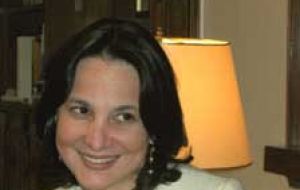MercoPress. South Atlantic News Agency
Chile announces plans to research nuclear energy
 Energy Minister Karen Poniachik
Energy Minister Karen Poniachik Energy Minister Karen Poniachik announced Tuesday that her ministry would begin technical studies into the potential use of nuclear energy in Chile. Facing criticism from both the governing Concertación coalition and opposition Alliance for delays in the government-mandated studies, Poniachik said the ministry would present a plan to assess the implementation of nuclear energy in March.
Congressman Antonio Leal said that he had asked Poniachik to proceed with the studies after President Michelle Bachelet ordered them undertaken last year. "Chile has to begin the studies today so that we can diversify our country's electricity-generating capabilities," said the lawmaker. As Chile faces a growing energy crunch, both government and opposition lawmakers have been critical of delays to the Ministry of Energy's studies. Chile currently produces 7,500 megawatts of electricity a year, but studies show that the country's growing economy will need an additional 5,000 megawatts within ten years to cover the needs of both households and the nation's burgeoning mining sector. Chile's study of nuclear energy will be controversial. The governing Concertación has strongly backed the use of nuclear energy, but the conservative Alliance oppositional coalition, consisting of the UDI and RN parties, has been more hesitant, promoting the construction of large damns in the southern Aysén region While Chilean politicians fight over what kind of energy to back, leading Chilean business conglomerations, including the Luksic, Matte and Angelini groups, expressed interest last year in making long-term investments in nuclear energy. "Management is constantly reviewing all possible electricity-generating technologies," said Bernardo Larraín Matte, the general director of the Matte Group's Colbún electric company. The Luksic group has also conducted high-level talks with leading French nuclear energy company Areva Group about the construction of a nuclear reactor that would connect Chile's northern and central power grids. Chile's interest in nuclear energy comes as Argentina admitted last year that its natural gas supplies to Chile might be permanently cut as early as 2007. Chile currently imports 72 percent of its energy in the form of petroleum, gas and carbon. "This dependency puts the country in a vulnerable position given the volatility of international prices and supply interruptions," said a PSE report released last August by the National Energy Commission. Although nuclear power stations are more expensive than conventional energy stations, the Areva Group said late last year that the nuclear option offers greater security. Nuclear energy is not subject to market swings, as are coal and petroleum, and is not vulnerable to climactic changes, unlike hydroelectric sources. As Chile faces the problems created by energy-dependence, growing energy demand, and pollution, the real issue behind the scenes could be the big money involved. Each political party in Chile is traditionally aligned with different business groups, and whatever option Chile decides to take â€" whether it be nuclear or hydroelectric â€" will certainly enrich one group at the expense of another. By Nathan Crooks The Santiago Times




Top Comments
Disclaimer & comment rulesCommenting for this story is now closed.
If you have a Facebook account, become a fan and comment on our Facebook Page!